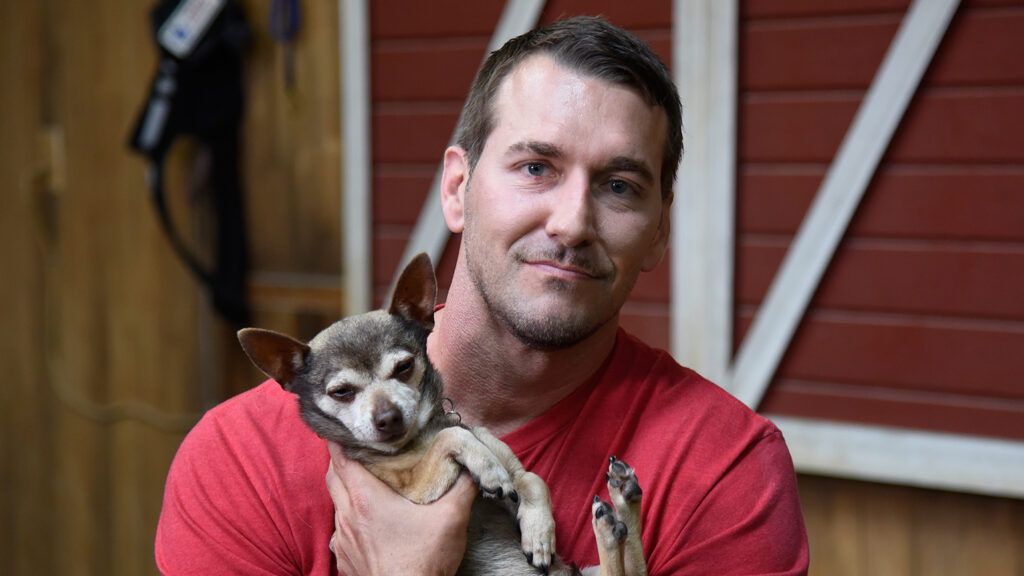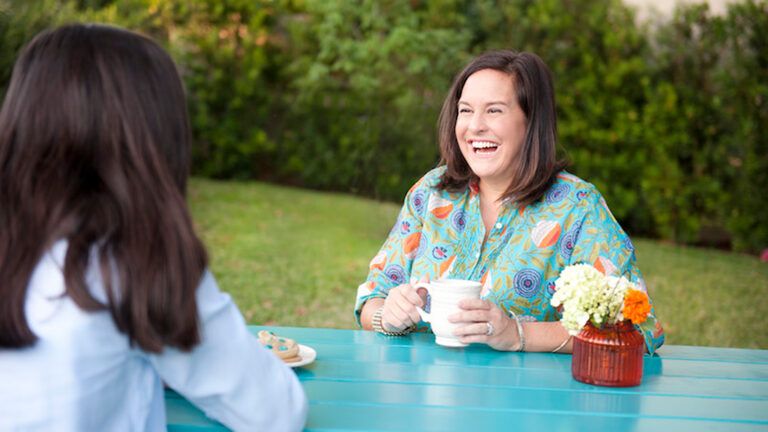The hallways at Walter Reed National Military Medical Center all looked the same to me. It was like making my way through a maze. I asked a nurse for directions, trying to ignore the knots in my stomach. Everyone I passed stared at the massive Doberman at my side. Some even started following us. I made a conscious effort to hold Apollo’s lead loosely. I didn’t want him to sense my tension, though as smart as he was, he probably picked up on it. We’d spent months preparing for this moment.
What if all that work had been for nothing? What if I was wrong and there were some dogs who couldn’t be trained? What if I’d failed to teach Apollo to do the most important job I’d ever trained a dog for? I’d taken on this project as a favor to a friend, but there had been a personal meaning to it as well. One that went back to my grandfather, who’d died when I was 11.
Grandpa was a World War II veteran. He’d lost a leg fighting, and he wore an old-school prosthetic, a locked leg that couldn’t bend or move. If he dropped his keys, he’d have to grab onto something and practically do the splits to pick them up. Because of Grandpa, I had a deep respect for the military. I’d even planned to enlist as soon as I turned 18.
Military life would be totally different from how I grew up. My childhood was a circus—literally. My father and my uncle were both professional animal trainers. Some kids have kittens or puppies. I had tigers, elephants, primates and bears. My favorites were the grizzlies. They are highly intelligent and train extremely well. Kind of like a German shepherd, except a grizzly weighs 800 pounds.
Just as I was about to sign my enlistment papers, my uncle convinced me to take a temporary gig helping him train animals for a movie. It was supposed to last nine months, but I kept getting more work in Hollywood. It turned out I had a marketable skill. I wasn’t exactly making a fortune as an animal trainer, but I felt fortunate to be making a living doing something I loved.
One day in 2011, one of my buddies, a retired Army officer, called. “A friend of mine named Tyler Jeffries was hit by an IED in Afghanistan. He lost both legs in the blast. Is it possible to train a service dog for him?”
I didn’t hesitate. “Yes,” I said. “Can you send me his number and some videos so I get an idea of what he needs?”
I’d trained just about every type of animal there was by that point, from rhinos to cockroaches, and I’d come to believe every animal can be trained. They just need the right training and—most important—the right trainer. Tyler had had 14 surgeries over the course of a year and a half. The videos showed him trying to learn to walk on his prosthetics. Even though Tyler’s prosthetics were much more advanced, I couldn’t help but remember Grandpa and how difficult it had been for him to get around.
I asked Tyler what his life had been like before he was wounded, and the challenges he faced now. He told me he’d always been an athlete. It was frustrating not to be able to navigate curbs and steps without leaning on someone else. Plus, his wheelchair wasn’t motorized. Going up a hill to his home took a massive amount of upper body strength.
Helping Tyler was an opportunity I hadn’t even known I was looking for. A way to serve the military and honor my grandfather. I thought back to a commercial I’d done, where I’d trained a dog to retrieve a drink from a fridge and bring it to a guy on a couch. That was service dog training, though I hadn’t thought of it that way at the time. All I needed was a dog big and strong enough to brace Tyler.
That’s how I ended up with Apollo. I called a well-regarded breeder of Doberman pinschers to see if they’d be willing to donate a dog to become a service dog for a disabled veteran. “You can have Apollo,” they told me, sounding almost relieved. “The person we sold him to returned him because he’s…difficult to handle.” Difficult to handle? Not for me, I thought.
I flew to the kennel. The breeder pointed out a powerfully built red Doberman. Perfect for physically assisting someone with balance issues. “Apollo,” I called. The dog came barreling at me, all 100-plus pounds of him, slamming me into the wall. Maybe this would be more challenging than I’d thought.
I put Apollo in my rental car and drove off. Within minutes, he gnawed the inside of one of the doors until the handrest and cup holder came off. His next trick? Lifting his leg and peeing on the backseat for a full 45 seconds.
At least he’s on a leash, I thought. Before we’d left the kennel, I’d clipped an old leather leash onto his collar—my lucky leash. One of my most prized possessions. As soon as we got to a rest stop, I’d show Apollo how to behave.
Then I heard Apollo chewing again. I gave that lucky leash a tug to get his attention. Half of it came flying into the windshield.
“That’s it!” I yelled. I pulled over and started training Apollo right then and there on the side of the road.
That was only the beginning. Apollo was the most out-of-control dog I’d ever worked with—the combination of his size, strength and complete lack of discipline was incredible. He tested my belief that every animal was trainable. That I could do my job. That helping Tyler was something I was meant to do.
There were times I had to send up a silent prayer. I didn’t really know the right words. I just knew I needed help from a higher power if I was going to get this dog ready to serve Tyler.
This wasn’t like the movies. The stakes were far higher. With movies, a director says, “Cut!” and you get another take to try again. But if a disabled veteran is about to fall, the dog has to brace him 100 percent of the time. I couldn’t accept “pretty good” for Apollo. He had to be perfect. That meant my training had to be perfect too.
Which was why I was so nervous making my way through the halls of Walter Reed. Introducing Apollo and Tyler would be my moment of truth.
Finally I spotted him. A tough-looking guy in a wheelchair. “Tyler?”
He rolled over, eyes locked on the Doberman at my side.
“I’m Brandon. And this is Apollo.”
They sized each other up. Apollo didn’t tackle Tyler. So far, so good. But Tyler’s expression didn’t change.
I explained everything Apollo could do. He could brace himself so Tyler could lean on him to go up and down steps and curbs. He’d learned to pull a wheelchair up an incline. He knew “left” and “right,” so he could steer the wheelchair on command. He could pick up anything that was dropped, even a cell phone or keys, which feel strange in a dog’s mouth.
Tyler rested his head against Apollo’s and patted the dog’s neck. Then he looked up at me, tears in his eyes. “Thank you,” he said.
Relief swept through me. And gratitude. Tyler had given so much for our country. Training a dog to help him regain his independence was an honor.
I figured I’d hand over the dog, shake Tyler’s hand, thank him for his service and walk off into the sunset.
But before I could leave, other wounded veterans approached me. All of them wanted to know the same thing: “Can you train a dog for me?” I grabbed a clipboard and started jotting down notes on what they needed.
As soon as I got home, I called my buddy Mike Herstik, a legendary military and law enforcement dog trainer. “I want to start a foundation with you,” I told him. “To train service dogs for disabled veterans.” Mike was totally on board. With the Argus Service Dog Foundation, we want to honor the reality our disabled veterans face. These men and women could do 80 push-ups in two minutes, hike for miles with a 65-pound pack, fire a rifle, take it apart and put it back together again, practically in the blink of an eye. Then suddenly they can’t even get out of a chair without assistance.
Our bodies deteriorate over time, but most of us have decades to get used to our decline. These veterans lose their strength—and likely their confidence—in an instant. Friends, family, even spouses might not stick around, but dogs don’t make excuses like, “You’re not the same person anymore.” Dogs are loyal for life.
As much emotional support as our dogs offer, Argus is one of the few nonprofits that provide assistance dogs. Most service dogs for veterans are trained to help with PTSD. We train our dogs to physically work. And we don’t charge the veterans a single penny.
I knew this was my calling the moment I saw Tyler’s reaction to Apollo. I gave up my work in Hollywood to focus on it. It wasn’t easy. Money was tight. I spent months sleeping on friends’ couches, going to happy hours so I could fill up on the free appetizers. I did a lot of silent prayer. If this was going to work, it would take more than just me.
Then in 2013, a Hollywood production company, Litton Entertainment, called. They watched me train shelter dogs to become service animals for disabled veterans and others with special needs, and wanted to produce a series on the topic for a new CBS Saturday-morning lineup. They offered me my own show, Lucky Dog, training shelter dogs to be the perfect companion for a particular individual or family. It was another opportunity I hadn’t realized I needed. The perfect combination of my show business background and my calling to train service dogs.
One thing I’ve discovered is that disabled veterans and rescued dogs don’t take things for granted. Traumatic incidents have changed them but haven’t stopped them. There is always hope, even when things seem hopeless.
If I ever need a reminder, I just look at the shredded pieces of leather I’ve hung on my wall. I can still see Apollo’s teeth marks. That’s right, it’s my lucky leash. Which turned out to be beyond lucky for me.
For more inspiring stories, subscribe to Guideposts magazine.
 |
Brandon McMillan is the author of Lucky Dog Lessons: Train Your Dog in 7 Days from HarperCollins Publishers. |





